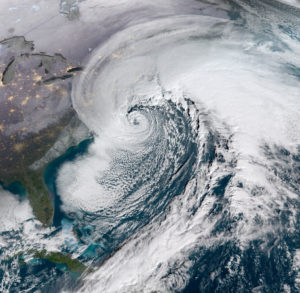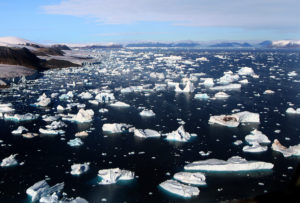On Jan. 4, a storm began developing on the East Coast. At first it was only a small falling of snowflakes and gentle winds. However, as the day wore on, it became a full fledged winter storm. Temperatures dropped, wind speeds picked up, and heavy snow fell on the cities.
This type of winter storm is referred to as a bomb cyclone. A bomb cyclone occurs when surface pressure drops 24 millibars in 24 hours. From Florida to Maine, temperatures dipped lower than they usually do during this point in winter. Alice Van Evera, who goes to Camp Mishawaka in Minnesota, but lives in Lexington, Mass. recalls that the temperature was around 0 degrees for a long time, saying it was “kind of unusual for that early in the season.”
Even Florida got a light dusting of snow, bringing it almost to a stop since the locals are unaccustomed to the snow. In Massachusetts high snow levels and freezing temperatures also created unsafe driving conditions, making roads icy and dangerous. “We had to check our brakes every time we drove,” Van Evera said, referring to how slick the streets were in her city.
The question scientists, citizens, and meteorologists alike are asking themselves is this: Is climate change the cause of these winter storms? The question is too complex to fully answer, but there are possibilities. Including hurricanes this season such as Harvey and Irma, there have been many severe storms. To many people, winter storms and global warming do not correlate. How could freezing cold temperatures and unusual amounts of snow be a result of a planet that is supposedly heating up?

According to Jeff Penner, a meteorologist for 41 Action News, when you get down to it, climate change is just “an increased frequency of extreme weather events.” It is “always tough to tell whether a storm system is affected by climate change,” Penner says.
However, signs indicate that this bomb cyclone and other recent tropical storms are a result of climate change. This storm dropped 54 millibars in 24 hours which is more than double the amount a bomb cyclone would drop. Ocean temperatures are rising, giving storms more energy and causing them to intensify more rapidly. Flooding occurred throughout coastal cities, making roads even more dangerous. “Ocean levels are about two to three inches higher…in other words, the higher ocean level made it easier to flood the coast,” Penner says, explaining how this particular winter storm did have elements related to climate change.
A weather pattern called The North American Winter Weather Dipole is getting more common and is related to changing global temperatures. With this pattern, the U.S. West Coast becomes abnormally warm, while the U.S. East Coast gets slammed with cold weather. Due to rising sea levels and the effect of greenhouse gases, days of extreme temperature are increasing. More and more evidence pointing to the validity of climate change is surfacing.

Weather is just one way global warming manifests itself in our daily lives. Fires are blazing in the west, while rain and snow are pummeling the east. There is no way this can be explained other than climate change. Some people deny it, but the truth is that humans are affecting the earth in ways that are irreversible. We pollute our cities, waste 40% of our food, and contaminate our air with gas and carbon dioxide. Global warming is no joke, and it is already interfering with our daily lives. If climate change results in “an increased frequency of extreme weather events,” then this season is a sign of our warming planet. Have an abnormally warm winter? It’s because of global warming. Is the ocean near you getting warmer every season? Again, global warming. Slowly we are burning up our fossil fuels and melting our glaciers and ice caps. If humankind goes on like this, all of our resources will be gone and we will be living in a totally different planet.















































































